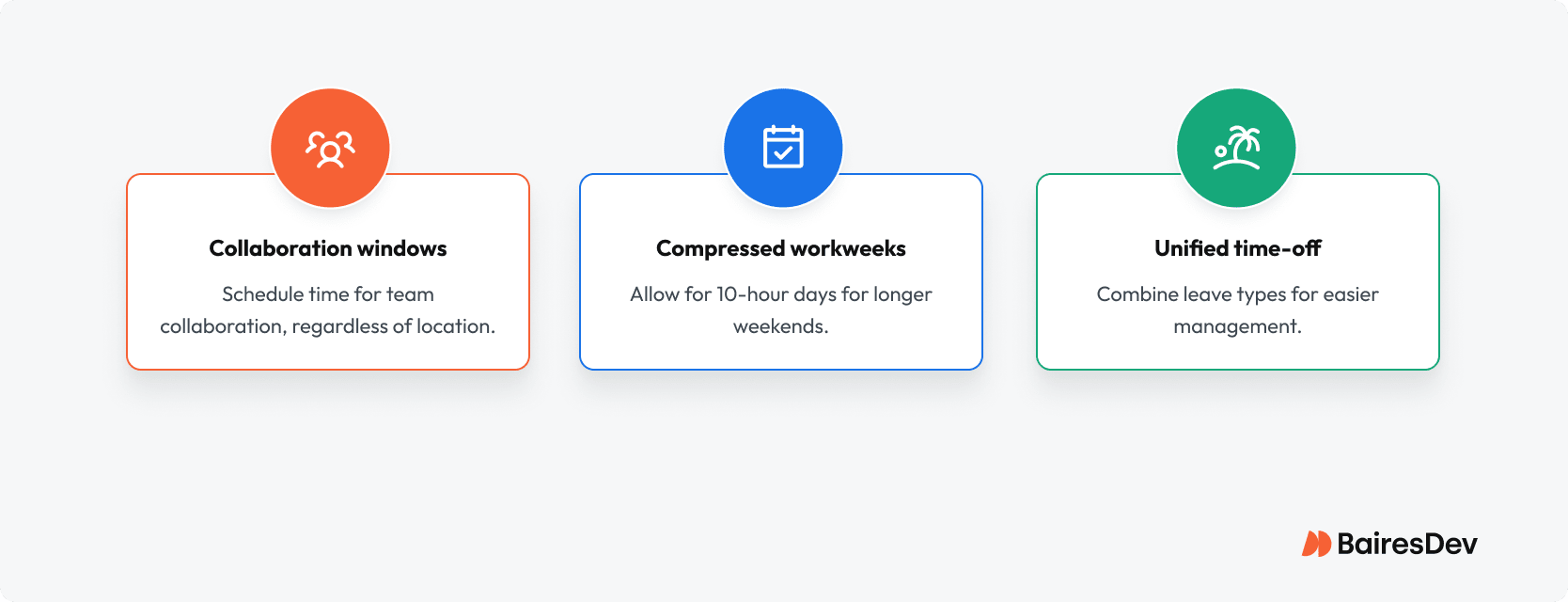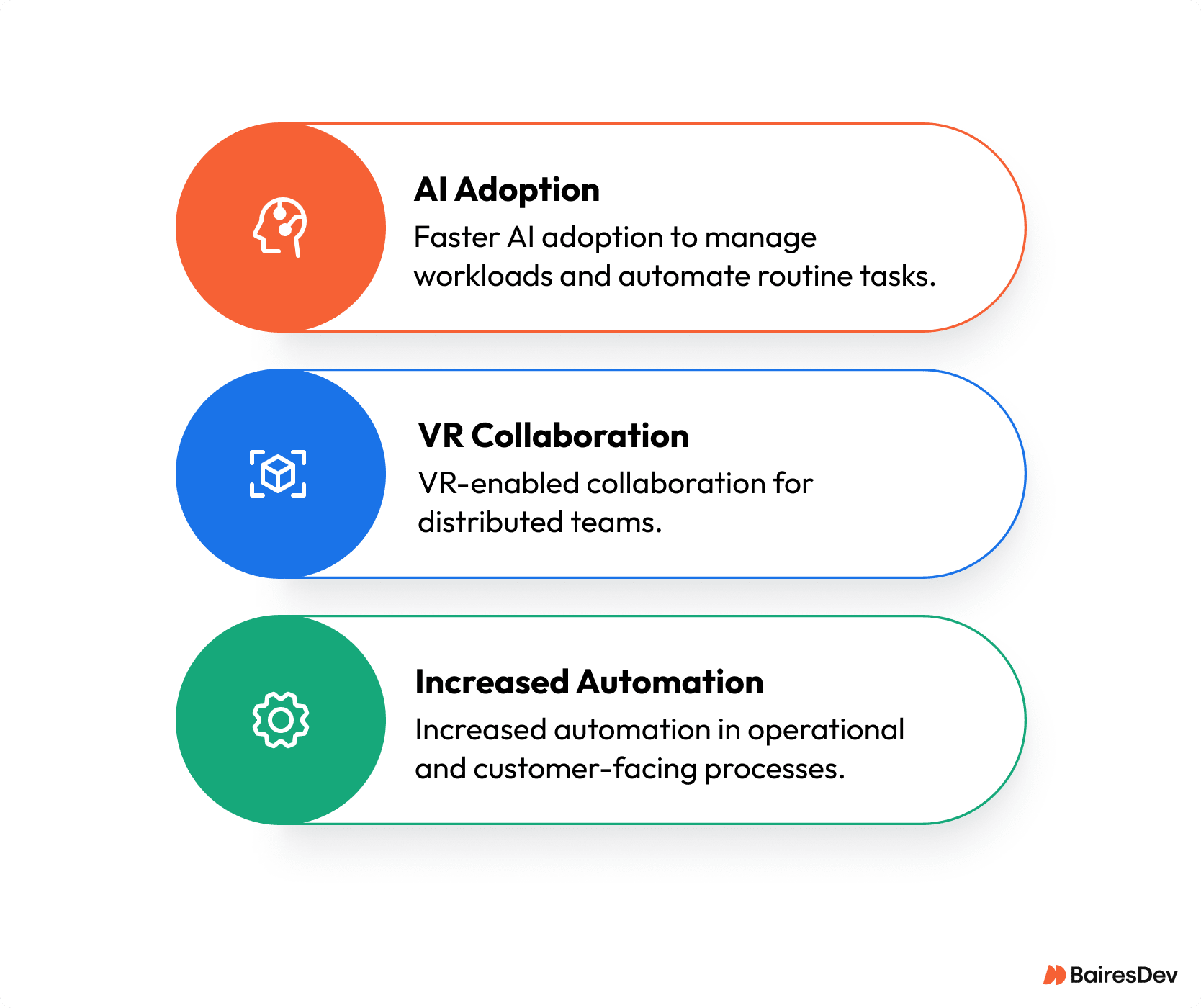The shift to remote work is not a fleeting trend but a foundational change in the labor market. While work from home was once a rarity, its adoption has accelerated dramatically, fundamentally reshaping how companies access talent.
Today, the critical question is not whether remote work is possible, but how to master it to drive a competitive advantage. Studies (including Nicholas Bloom’s well-known Stanford research and newer research from government agencies and economic policy institutes) confirm that remote work increases productivity under the right conditions, which in turn leads to improved talent retention and operational efficiency.
However, these gains are not guaranteed. The difference between success and failure in a distributed model comes down to specific leadership choices: how work is structured, how technology is deployed, and how performance is measured.
The Five Factors Driving the Remote Work Revolution
Whether your teams are remote, hybrid, or working from home part of the week, productivity depends on five interconnected factors:
Factor |
Enterprise-Level Example |
|---|---|
Work Environment Quality |
Remote setups drive measurable gains: working from home has been shown to increase productivity by ~13%, boost satisfaction, and halve attrition in some cases |
Flexible Work Arrangements |
A widely published study of hybrid work—including remote days—found no negative impact on productivity and a significant boost in retention. Comprehensive trials in the UK also showed that a four-day workweek reduced absenteeism by a third and attrition by 57%. |
The Right Tools |
Enterprise resource planning (ERP) or PMO systems that consolidate workflows, timelines, and budgets improve coordination and reduce delays by centralizing project data. |
Performance Metrics |
Studies show that clear KPI measurement strongly correlates with organizational effectiveness—one analysis attributes 62% of performance variation to KPIs and employee performance measurement. The U.S. GAO also reported a 12% productivity increase in roles with measurable expectations when remote. |
Culture and Support |
Recognition programs drive engagement—companies with strong recognition are 48% more likely to report high retention and teams that feel valued are about 2.5 to 4 times more likely to be highly productive. |
For example, a 2022 study found that fully remote workers performed as well or better than office workers in tasks requiring deep focus, provided they had access to modern collaboration tools and minimal constant interruptions.
Implementing the Five Factors
Now that we’ve identified the key factors influencing remote productivity, let’s take a closer look at how to put them into practice.
Work Environment Quality
A strong environment is a prerequisite for productivity, whether you’re in the office or working remotely. Without it, even the most skilled employees can’t perform their best.
How leading companies handle it:
- Stipends and procurement programs. Providing financial support for these helps employees set up their home offices. Providing them with the necessary technology goes a long way to demonstrate that you’ve invested in their success and well-being.
- Workspace optimization guidance. Sharing instructions and advice on lighting, sound, and ergonomics helps employees as they create a workspace that reduces distractions. The pay-off? improved focus and the prevention of ergonomics-related health issues.
- Boundary setting. Encourage employees to establish a dedicated workspace and schedule to aid with maintaining a healthy work-life balance. Clear boundaries between work and personal time go a long way to prevent burnout.
Ultimately, a well-equipped environment does more than boost morale—it reduces errors, speeds up onboarding for new hires, and minimizes downtime from preventable technical issues.
Flexible Arrangements
Work arrangement flexibility boosts motivation, but unstructured schedules can cause operational friction.

How leading companies handle it:
- Core collaboration windows. Set 3-4 hours where all team members are available, regardless of location.
- Compressed workweeks. Consider allowing four 10-hour days to give employees longer personal weekends without reducing output.
- Unified time-off policies. Combining vacation, sick leave, and personal days into one pool makes for easier management and increased control for employees.
In practice, this means an engineering team in North America can hand off work seamlessly to a LATAM counterpart, maintaining velocity without forcing odd working hours.
The Right Tools
Technology can make remote work seamless—or painfully inefficient.
How leading companies handle it:
- Project management. Enterprise tools like Jira, Asana, or Monday.com for structured workflows, often integrated with version control systems.
- Communication. Slack, Microsoft Teams, Zoom for real-time coordination, with policies to reduce meeting overload.
- Time tracking. Toggl, Harvest, or enterprise equivalents to identify productivity patterns and adjust workloads.
- Automation and AI. ChatGPT, Claude, or other enterprise-grade AI to automate documentation, reporting, or data extraction.
- Virtual and augmented reality. Platforms like Virbela or Engage for virtual collaboration and role-specific training..
Tool strategy is about ecosystem coherence—not having the most tools, but the right combination for your workflows.
Performance Metrics
Labor productivity should reflect results, not attendance. Measuring hours without considering output leads to productivity paranoia.
How leading companies handle it:
- KPIs. Define clear KPIs tied to business outcomes—project completion rates, client satisfaction scores, or revenue impact.
- Timekeeping. Use time tracking only as one input, not the sole measure.
- Regular reviews. Incorporate peer reviews and self-assessments to capture qualitative factors like collaboration quality.
These methods enable you to measure output without micromanaging your employees.
Culture and Support
Fully remote work can blur personal and professional boundaries, especially for parents and caregivers. Without intentional boundaries, the risk of burnout rises sharply.
How leading companies handle it:
- Protected focus time. Schedule “no-meeting” blocks to protect focus time.
- Well-being resources. Provide access to confidential counseling and wellness stipends.
- Manager Training for Empathy. Offer manager training to recognize the early signs of disengagement or overload.
In practice, this means that when a project hits a critical milestone, leaders celebrate in ways that match the team’s culture—sometimes with a virtual event, sometimes with time off. The point is recognition is consistent and meaningful.
The Economics of Remote Work
From an economics standpoint, remote work reshapes cost structures and labor markets. Firms reduce spending on office space and associated overhead while gaining access to talent in lower-cost regions:
- Real estate savings. Downsizing office space can save millions annually for large employers.
- Wider talent pool. Remote work allows companies to hire for skills, not proximity, increasing diversity and access to scarce expertise.
- Reduced turnover. Flexible arrangements and supportive policies increase employee loyalty, lowering the costs of recruiting and onboarding.
The strategic value of remote work extends beyond immediate cost savings. It’s a complete re-evaluation of how, where, and with whom your firm can execute on its vision. The shift toward distributed operations is a chance to build a more resilient, dynamic, and effective organization.
The Future of Remote Work
The next decade will bring hybrid models, selective in-office use, and greater reliance on technology. The priority for leaders is refining operations so remote work remains a growth driver, not just a cost reducer.

Expect faster AI adoption to manage workloads and automate routine tasks, as well as increased automation in operational and customer-facing processes.
Enterprises that treat remote work as a long-term operating model—with governance, budget planning, and talent strategy built in—will see sustained returns.
FAQs
How can remote work increase productivity?
By allowing employees to have more control over their work environment, reducing long commutes, and minimizing constant interruptions—all supported by the right tools and business leaders’ practices.
What factors most influence remote work productivity?
These are environment quality, structured flexibility (for hybrid work and fully remote work), integrated technology, measurable goals, and a supportive work culture.
How do business leaders measure labor productivity remotely?
Business leaders measure labor productivity through KPIs, qualitative reviews, and balanced time tracking, with a focus on output over hours.
Can remote work negatively impact productivity?
Yes, remote work can negatively impact productivity. It can lead to decreased productivity if employees lack proper tools, a clear work arrangement, or expectations.
How does hybrid work compare to fully remote?
Hybrid work provides the opportunity for collaboration in the office, while still offering the autonomy and flexibility of working from home time. Fully remote work is performed entirely out of the office. Leadership would need to seriously study the data on the benefits and drawbacks carried by each model.
What role does technology play in sustaining productivity?
Technology is the backbone. The right software and new technologies enable communication, workflow management, and automation.
How should managers address productivity paranoia?
Managers should address productivity paranoia by setting clear goals for their workers. They can provide visibility through data, and focus on outcomes rather than monitoring or micromanaging.
What is the future of commercial office space in a remote-first world?
Commercial office space is evolving. Many firms are downsizing and reconfiguring for periodic collaboration instead of daily occupancy. Commercial real-estate prices reflect this trend.
How can employers support remote employees’ mental health?
Employers can support remote employees’ mental health by offering flexible schedules, mental health resources, and encouraging boundaries, especially for parents and other caregivers.
What are the biggest benefits for companies embracing remote work?
The biggest benefits for companies embracing remote work are access to a broader workforce, reduced office space costs, potential productivity growth, and improved job satisfaction for employees to work in an arrangement that fits their lives.






